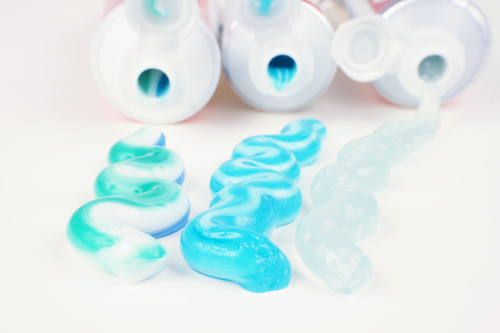
We hear this question a lot from our patients, and it’s a great question you should be asking. Often when we go to the drugstore for our list of daily essentials, you will find an entire wall of toothpaste options. Some whiten, some are for sensitive teeth, and the ingredients lists all seem to vary slightly depending on the brand.
It can be difficult to navigate the minefield of advertising gimmicks and specialty claims, but understanding the facts behind the toothpaste hype can make you a more informed consumer.
Fluoride: The Most Vital Ingredient
A toothpaste that contains fluoride is considered imperative by most dentists because brushing twice a day with a fluoride toothpaste is a staple in managing proper oral hygiene because of the proven cavity fighting properties fluoride possesses.
Many natural toothpaste formulas do not contain fluoride, so it’s best to consult with your dentist on which specific brands they can recommend that do.
Look For the ADA Seal of Acceptance
Tubes of toothpaste that have the American Dental Association’s (ADA) approval are guaranteed to meet the stringent requirements and you may be surprised to learn that many reputable toothpaste brands do not carry the seal of approval. Checking for the ADA seal when selecting a toothpaste is recommended.
Does Whitening Toothpaste Really Whiten Teeth?
Toothpastes that advertise their whitening effects often contain abrasives or other additives that work to remove surface stains from the outer layer of enamel on your teeth. Whether due to aging, smoking, or drinking dark-colored beverages, there are many benefits to using a whitening toothpaste including:
- Effectively removing surface stains. Most whitening toothpaste brands do effectively scrub away surface stains that linger on the outer layer of your enamel.
- An affordable way to whiten. A whitening specific toothpaste is typically similar in price to other basic toothpaste types, making it an appealing and affordable way to gradually whiten your teeth at the same time as brushing.
A Whitening toothpaste will not likely have much effect on deep intrinsic stains, but they do have the ability to help control day-to-day stains caused by eating, drinking or smoking. Since the main active ingredients in a whitening toothpaste are abrasives, they can damage the enamel over time and cause tooth sensitivity if used too often.
Reducing Tooth Sensitivity With Toothpaste
Teeth can become sensitive when their pulp has little to no protection from temperature changes in the mouth. The best toothpaste for sensitive teeth should also contain fluoride, which will help to strengthen weak or eroded enamel and help to prevent tooth decay from progressing. If you still experience extreme tooth sensitivity even while using an over-the-counter toothpaste, your dentist can prescribe a high-strength fluoride toothpaste to help treat your overly sensitive teeth.
Understanding Natural Toothpaste Options
As more and more natural toothpaste options emerges onto the market, it’s easy to be a little suspect as many of these are fluoride-free. Technically speaking, you do not actually need toothpaste to effectively remove the dental plaque from your teeth because the action of the toothbrush bristles and dental floss disrupt the dental plaque that ultimately leads to tooth decay and gum disease. The benefit of having fluoride in your toothpaste is that the fluoride will help to reduce the demineralization process, which is the first stage of tooth decay. Fluoride also helps to disrupt dental plaque, allowing patients who use fluoride to see less potential for tooth decay.
Avoiding Sweetened Toothpaste
While it may seem like an obvious statement, using a toothpaste that contains sugar to make it sweet or flavored can contribute to tooth decay and other health problems. These artificially sweetened mint toothpaste alternatives are often aimed towards children and are especially high in sugar, so be sure to read labels and know the ingredients.
Talk To Your Dentist About Finding the Right Toothpaste
Using the right toothpaste for your specific needs is necessary and important in establishing and maintaining healthy oral hygiene. No one toothpaste is going to be enough without proper brushing and flossing. If you need help in finding the right type of toothpaste for your hygiene needs, ask Hinsdale Dentistry which type of toothpaste we recommend for your teeth at your next dental exam.